Intel Core i9-13900K and i5-13600K Review: Raptor Lake Brings More Bite
by Gavin Bonshor on October 20, 2022 9:00 AM ESTGaming Performance: iGPU
Despite updating the main bulk of our CPU test suite for 2023 and beyond, we've not had a chance to test every integrated graphics chip in our stack of CPUs. As a result of this, we've included limited results for our iGPU-based gaming tests, although it is more than enough to get to grips with improvements in Raptor Lake performance.
As a reminder, We are using DDR5 memory on the Core i9-13900K, the Core i5-13600K as well as Intel's 12th Gen (Alder Lake) processors at the following settings:
- DDR5-5600B CL46 - Intel 13th Gen
- DDR5-4800 (B) CL40 - Intel 12th Gen
All other CPUs such as Ryzen 5000 and 3000 APUs were tested at the relevant JEDEC settings as per the processor's individual memory support with DDR4.
Final Fantasy 14
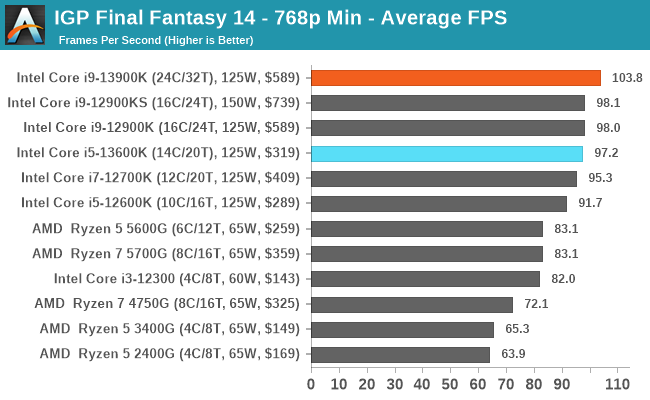
World of Tanks
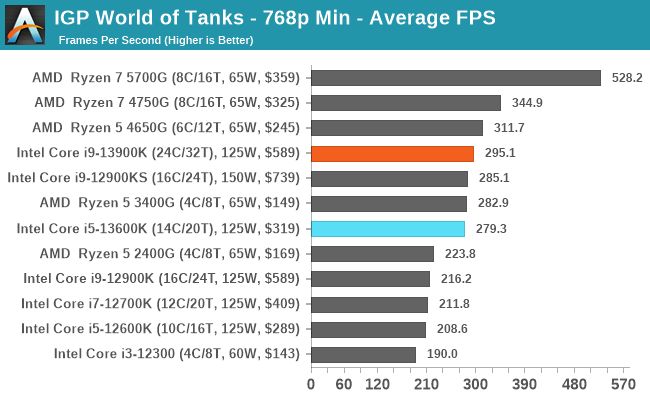
Borderlands 3
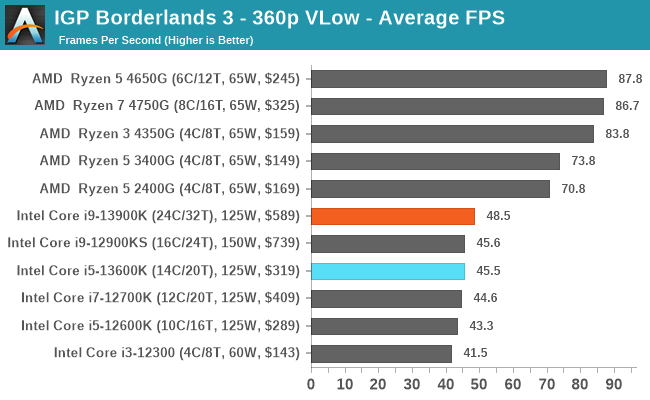
Far Cry 5
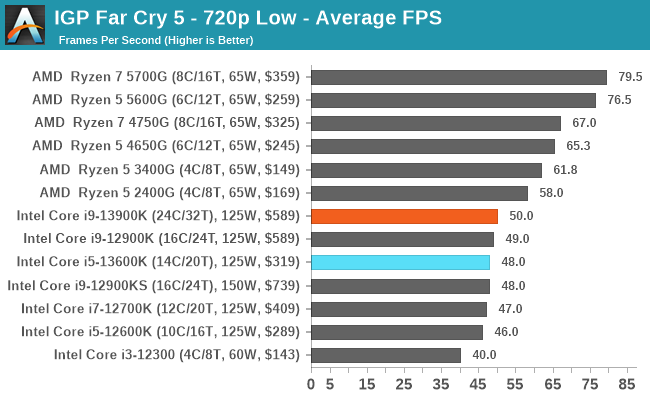
Grand Theft Auto V
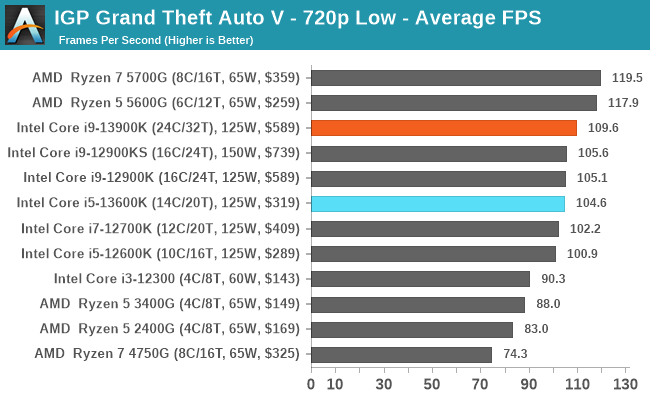
Strange Brigade (DirectX 12)
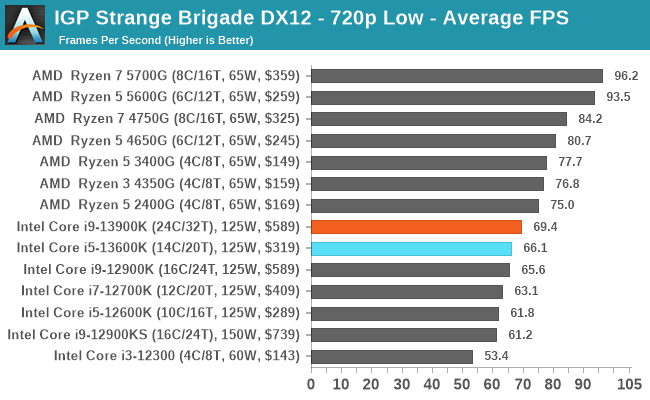
For both 13th and 12th Gen Core series processors, Intel is using the Xe-LP based 770 HD graphics processor. This means the overall integrated graphics performance between the two is almost identical.
In our integrated (iGPU) graphics testing, the power of Intel's Raptor Cove cores combined with more E-cores does show a distinct, but negligable advantage when using Intel's 770 HD graphics. This advantage is clear in Final Fantasy 14 where more cores and more CPU power are advantageous for performance.
Looking at the iGPU performance of both the Core i9-13900K and Core i5-13600K in our other tests, the Core i9 performs best out of Intel's chips, but in games where graphical power is required, the AMD 5000 series APUs do come out best. The Core i5-13600K also performs marginally worse than the Intel Core i9 12th Gen series, but this is to be expected.










169 Comments
View All Comments
adenta180 - Friday, June 23, 2023 - link
Did you guys ever get to the bottom of this SPECint rate GCC regression on 13900K? ReplyAvalon - Friday, October 21, 2022 - link
I think it's starting to become a little disingenuous to list the default TDP in the benchmarks, when it's become increasingly obvious over the past few generations that Intel chips run nowhere in the stratosphere of those TDPs.When you see a "125W" $589 chip virtually tied with a "170W" $699 chip it makes it seem like Intel is a no brainer. Might be time to start putting actual power draw in each of the tests in there, or simply leave stock TDP out, because listing a Core i9 at "125W" when it's running 50-100W higher than an equivalent AMD chip doesn't make much sense any longer. Reply
WannaBeOCer - Friday, October 21, 2022 - link
Did you even read the article? Intel advertises the 13900k as a 253w chip. It drew 32% more than it advertised while AMD advertises its 7950x as a 170w and it drew 30% more than they advertised. On all of Intel’s slides“Processor Base Power
125 W
Maximum Turbo Power
253 W” Reply
bcortens - Saturday, October 22, 2022 - link
Doesn’t matter if they advertise it. The charts are misleading because the W number at the left of the chart has nothing to do with the power consumed to get the performance indicated in the chart.They should really just leave the W number off or show a measured average W required to complete the test. Then the number would have meaning. As it stands, for the purposes of the graph, the number doesn’t mean much. Reply
Avalon - Friday, October 21, 2022 - link
And, to be fair to Intel, why are some of the IGP gaming benchmarks only showing the 12th and 13th gen Intel vs AMD APUs? There's really nothing to be gleaned from this; of course APUs will be faster in IGP tests. If you can't do like for like, then either just publish the Intel scores or don't publish at all. ReplyIketh - Friday, October 21, 2022 - link
In your closing comments about power consumption, I was reminded about the AMD article that compared the performance difference between 230W and 65W. I think you should also mention that in this article. I'm holding out for AMD mobile parts. Those laptops will be nice. ReplyIketh - Friday, October 21, 2022 - link
125W on Intel 7 process, when it's actually 325W on 10nm lmao... pure marketing ReplyWannaBeOCer - Friday, October 21, 2022 - link
Did you even read the article? Intel advertises the 13900k as a 253w chip. It drew 32% more than it advertised while AMD advertises its 7950x as a 170w and it drew 30% more than they advertised. On all of Intel’s slides“Processor Base Power
125 W
Maximum Turbo Power
253 W” Reply
bcortens - Saturday, October 22, 2022 - link
Reviews shouldn’t care about the advertised power, or what it says in the bios when you set the “limit” to 65 watts, reviews should actually measure and report the real power draw.We don’t read reviews to read intel and amd marketing numbers, we want to know the real numbers for a given workload Reply
Iketh - Sunday, October 23, 2022 - link
what on earth does that have to do with my statement Reply